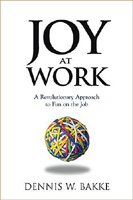
|
 |
Joy At Work: A Revolutionary Approach To Fun On The Job Dennis Bakke 
Format: Paperback, 314pp. ISBN: 9780976268642 Publisher: Pear Press Pub. Date: July 1, 2006 Average Customer Review: For Bulk Orders Call: 626-441-2024  Dennis Bakke's Top Ten 1. When given the opportunity to use our ability to reason, make decisions, and take responsibility for our actions, we experience joy at work. 2. The purpose of business is not to maximize profits for shareholders but to steward our resources to serve the world in an economically sustainable way. 3. Attempt to create the most fun workplace in the history of the world. 4. Eliminate management, organization charts, job descriptions, and hourly wages. 5. Fairness means treating everybody differently. 6. Principles and values must guide all decisions. 7. Put other stakeholders (shareholders, customers, suppliers, etc) equal to or above yourself. 8. Everyone must get advice before making a decision. If you don’t seek advice, “you’re fired.” 9. A “good” decision should make all the stakeholders unhappy because no individual or group got all they wanted. 10. Lead with passion, humility, and love. Chapter 6 Summary: Leading To Workplace Joy Business guru W. Edwards Deming said a leader’s job is to drive fear out of the organization so that employees will feel comfortable making decisions on their own. Most leaders do not show the humility to make that process a priority. But to Bakke, a willingness to serve and help others do better is crucial in a leader. Leaders must interpret an organization’s shared values and principles. They are advisers to everyone in an organization, and they demonstrate integrity as the organization’s collective conscience, pushing it to reach its goals and live up to its ideals. Leaders must realize that character is transparent to those around us. People “catch” character, virtue, and values by observing and practicing “right” behaviors and actions, and making them habits. When a leader acts as if he or she is the center of the organization, everyone else feels extraneous. It takes courage for a leader to delegate and free his or her people to act, exercising their natural gifts and fulfilling their potential. Leaders who create dynamic, rewarding, enjoyable workplaces love people, love spending time with them, and love affirming that they are worthy and important. Where leaders and board members can exercise tight control is on issues that affect the strategy and shared values of an organization. With the exception of those required by law to be made by top executives, all other decisions, including those with major financial implications, should be delegated to team members who are closest to the matter under consideration. Leaders must serve as advisers—advisers able to distinguish an organization’s unchanging principles from its constantly changing strategy. Bakke and AES board members became active advisers on every important issue facing the organization, which tended to offset their loss of enjoyment in surrendering decision-making control. Bakke believes the result was that AES directors were far more influential, committed, and engaged than those of more conventional companies. Leaders must also put a high priority on accountability. When the Shady Point problem occurred in 1992, Bakke took a 30 percent reduction in his own pay that year as the most senior person responsible for adherence to AES values. Other corporate officers and leaders in the plant also took pay reductions ranging from 10 to 20 percent. Taking responsibility must become a habit in order for each worker to trust in the organization and partake in the joy and accomplishment that the workplace offers. |
|

The Essential Lists BOOKS TO READ BEFORE YOU LEAD 
Grow Your Leadership Skills NEW AND UPCOMING LEADERSHIP BOOKS 
Classic Leadership Books BOOKS TO READ BEFORE YOU LEAD |
 |
| ||
 | © 2020 LeadershipNow™ All materials contained in https://www.LeadershipNow.com are protected by copyright and trademark laws and may not be used for any purpose whatsoever other than private, non-commercial viewing purposes. Derivative works and other unauthorized copying or use of stills, video footage, text or graphics is expressly prohibited. |
||